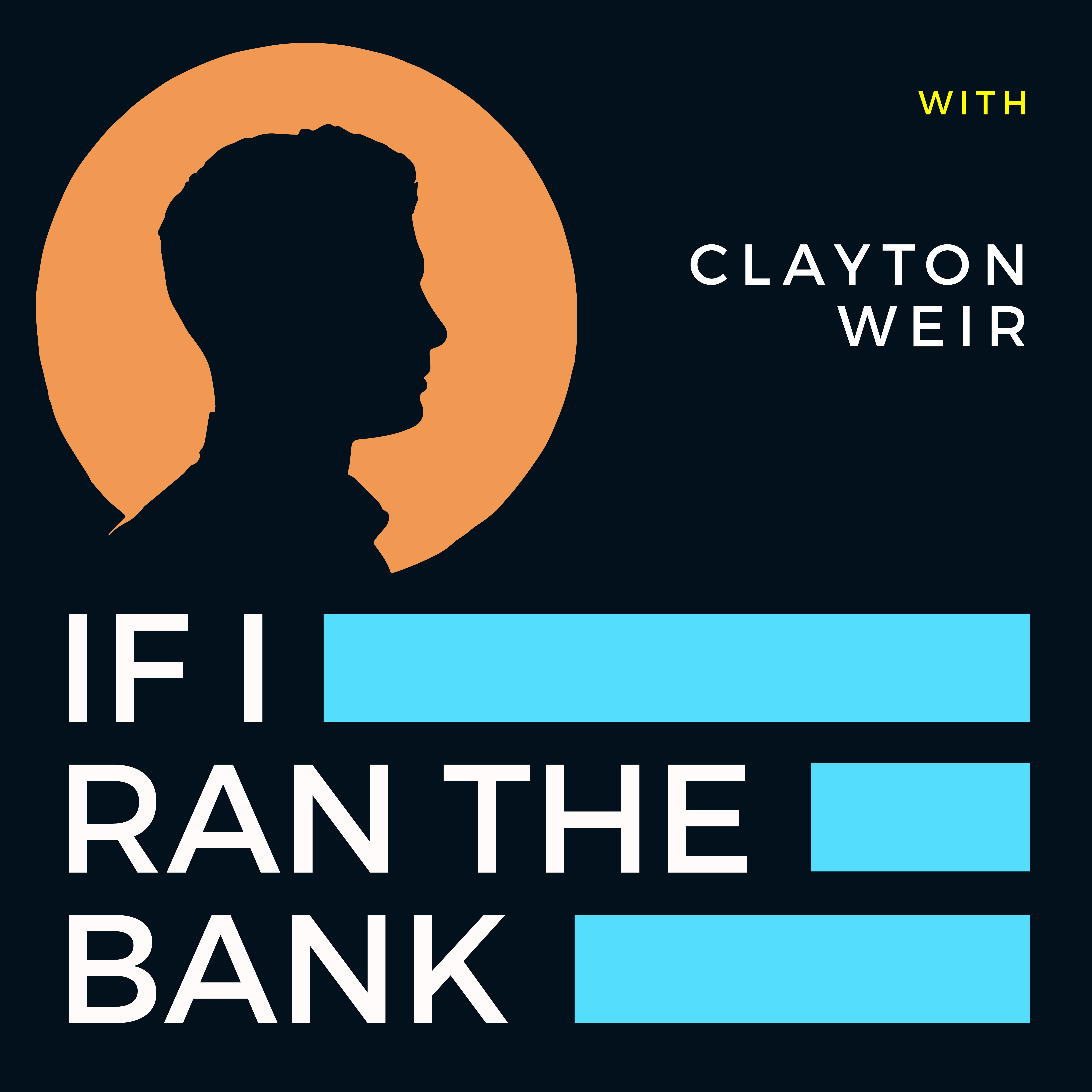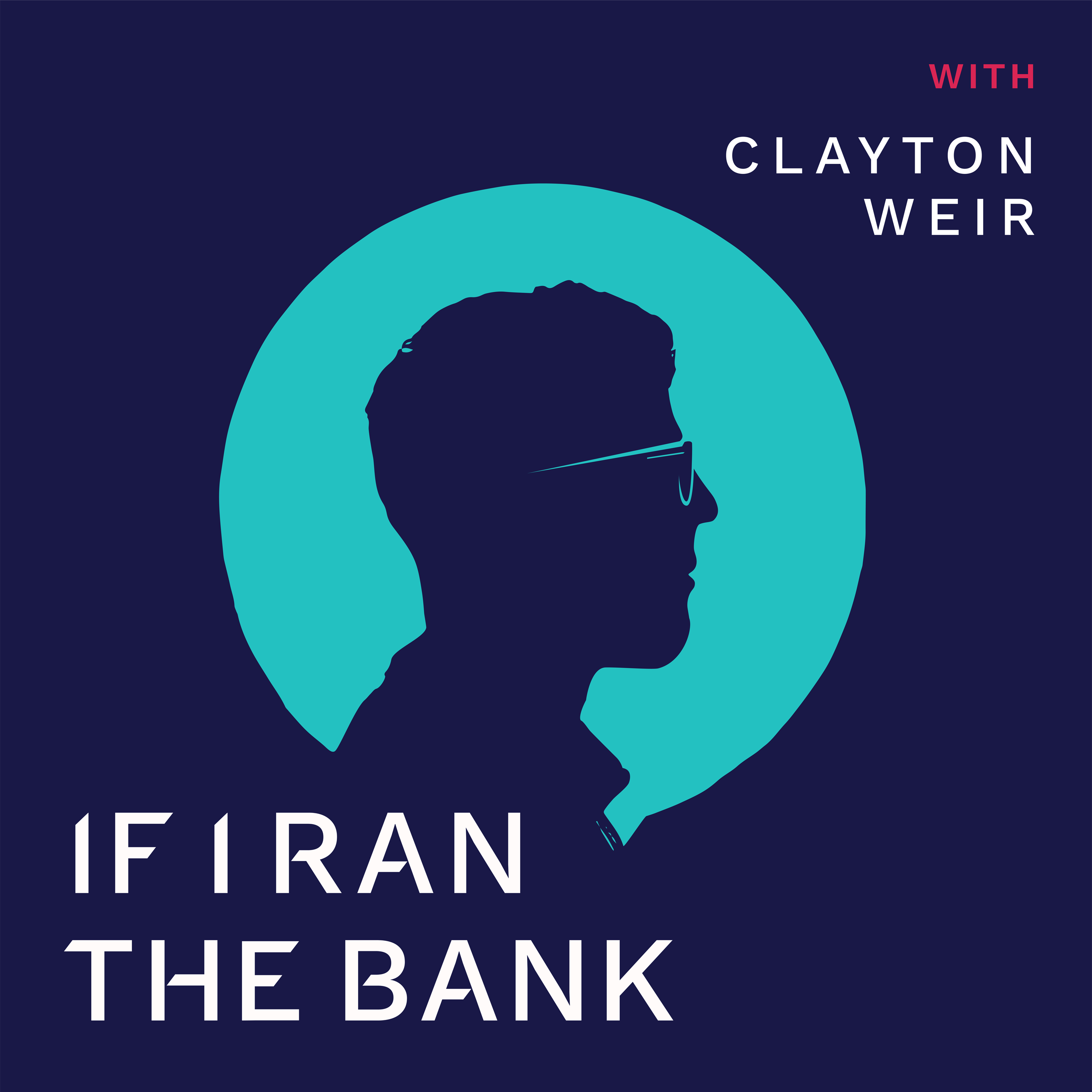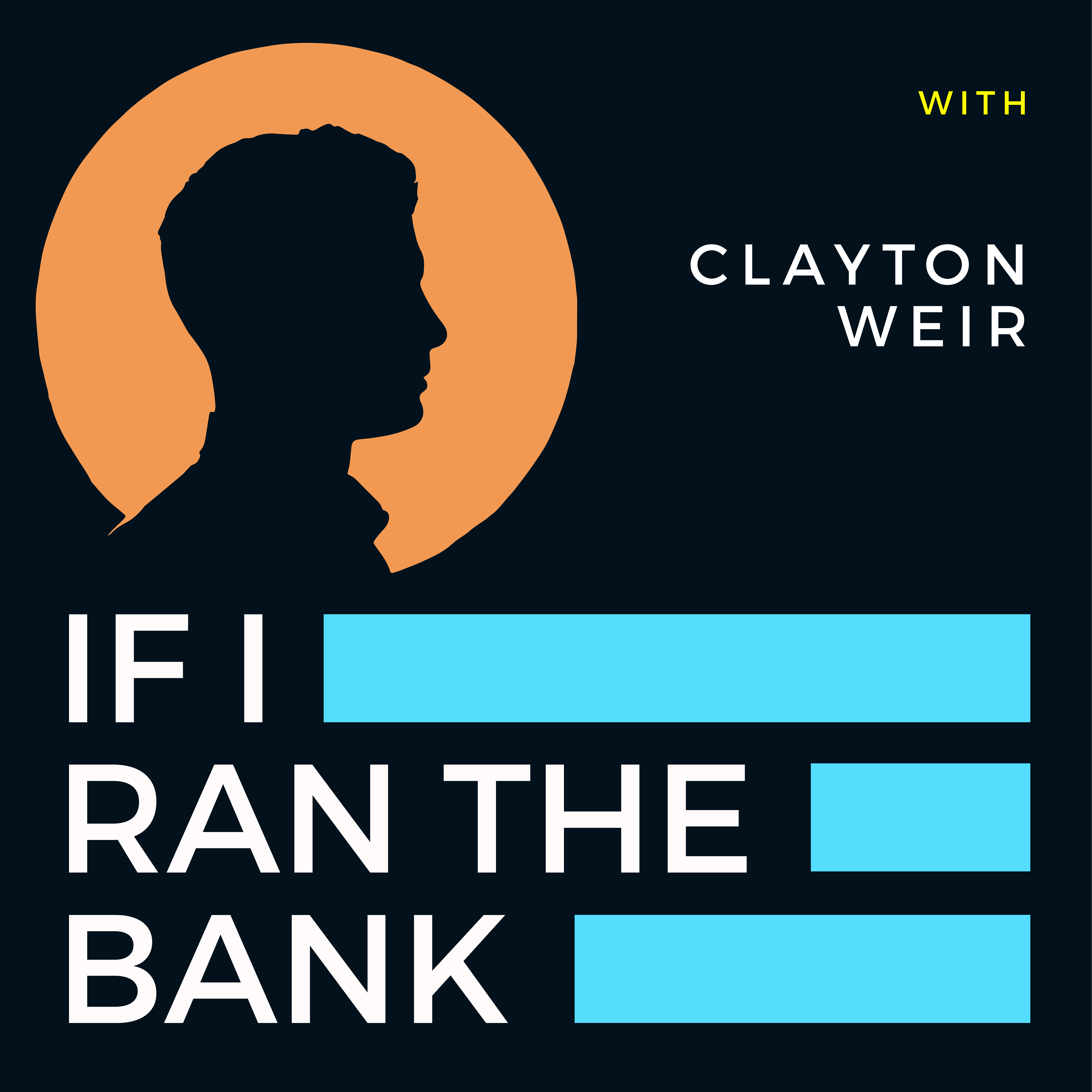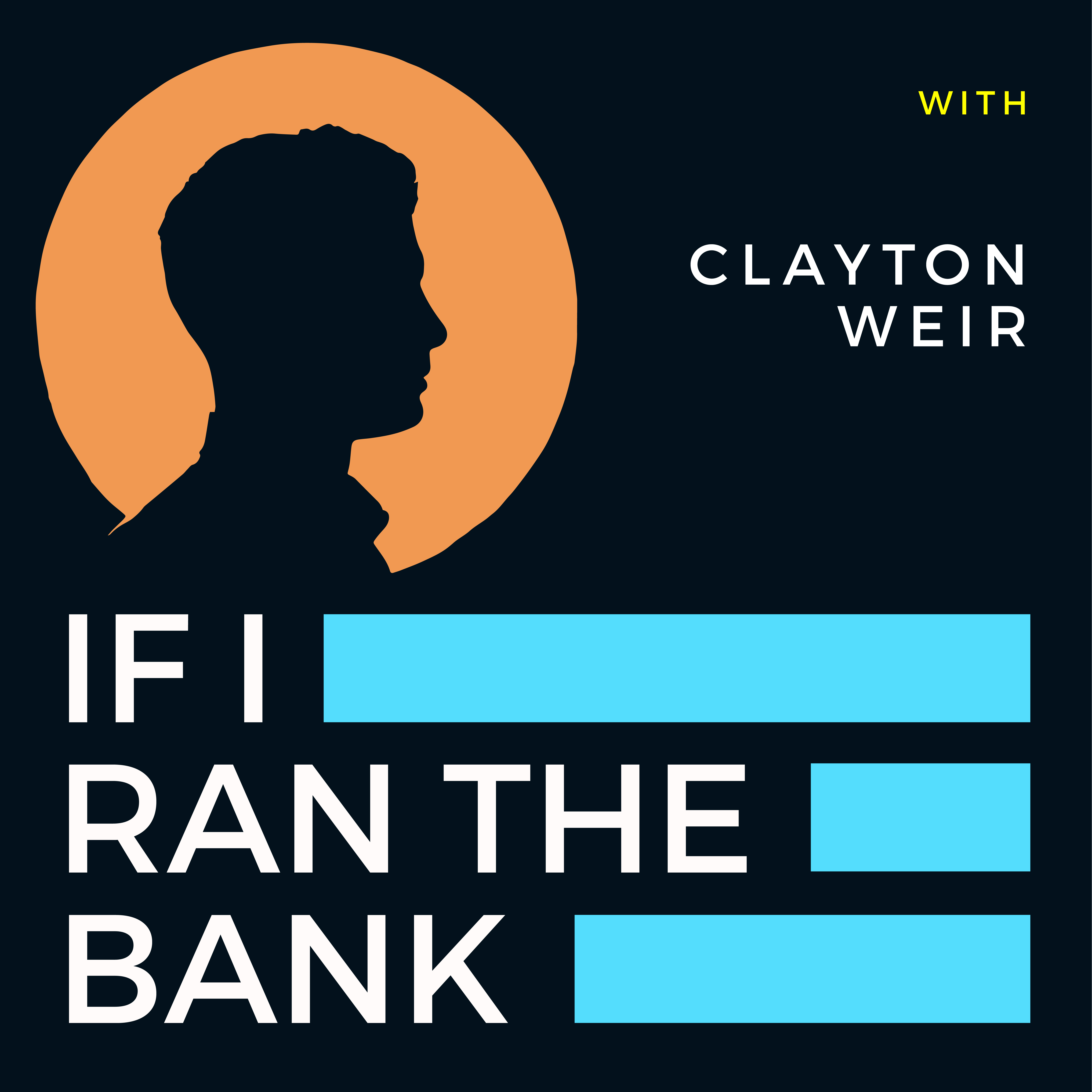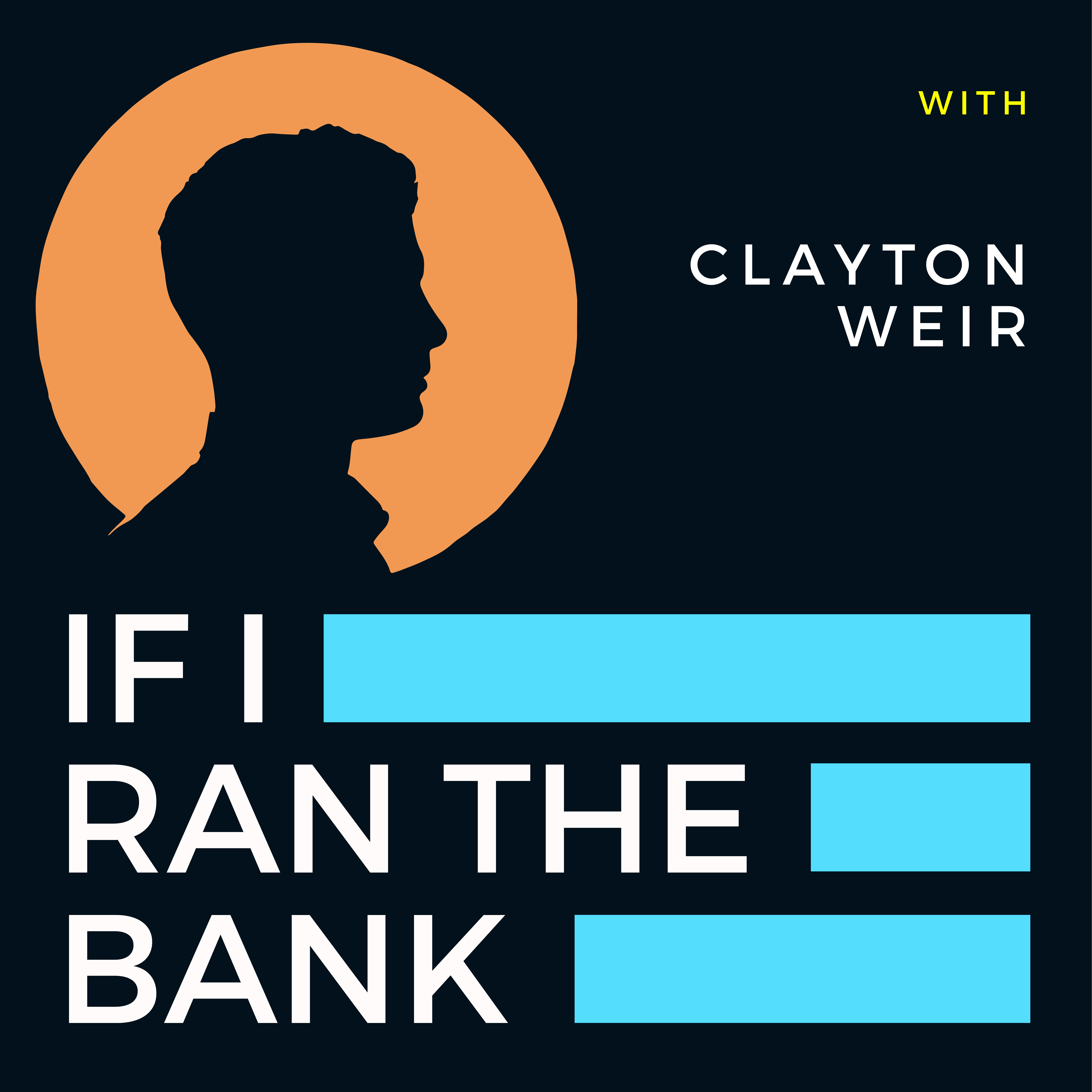A Win for The Customer is a Win for the Bank with Dave Pike
- 0.5
- 1
- 1.25
- 1.5
- 1.75
- 2
Announcer: If I Ran the Bank is a podcast hosted by Clayton Weir, Co-founder and Head of Product and Strategy at FISPAN, a fintech that is enabling banks to provide contextualized consumer like experiences to their business clients. Clayton is a leading thought leader in financial innovation and hits on the hottest topics in banking, finance, and the future of payments. And he wants to know, if you ran the bank, what's the one thing you'd go all in on? Please tune in to Spotify, Apple Podcasts, Google Play, or wherever you get your podcasts. And now, here's your host, Clayton Weir!
Clayton: Hey everyone. Welcome to another episode of If I Ran the Bank. I'm your host, Clayton Weir. This week, I'm super excited to have a personal friend of mine, David Pike, as a guest. I first met him a couple of years ago, when he was still sort of running a bank, I guess it's one of the largest banks in Australia at that time. And now, since retail and merchant paying, clearing infrastructure, I guess, or at least that's the organization you work for in Australia. I wonder if you'll be able to give a little bit more color about what you're up to these days.
Dave: Yeah. So, when I met you, Clayton, I'm also working for a large bank, normally in the business bank, building payment channels and corporate internet banking channels, and was exploring APIs with that bank. Right now, I'm working at EFTPOS, which is the equivalent of the Australian local debit card network. It's very similar to INTERAC in North America, where it has its own proprietary debit card, as well as being able to process the Visa, MasterCard, debit card transactions. And my role there is head of APIs and new flows, trying to build capability for the banks to do more merchant acquiring sort of innovation. So, there's a concept of switch to acquire versus switch to issuer, which means rather than the merchant systems talking directly to the acquiring bank, they actually talk to the switch. It's more efficient, less costly, because there's less systems involved. But basically means the banks can outsource the acquiring processing to us, but still keep the relationship workaround. And we're also looking at building out new capabilities. So, we're doing things like deposit withdrawal messaging for ATMs, and EFTPOS devices. So, you can actually deposit money into your bank through an EFTPOS device. As well as enabling wallets to physically transfer money from bank accounts through the cards. So, it's very interesting stuff using [inaudible], which it's not an area of expertise, but I'm fast-learning.
Clayton: Yeah. Very interesting. And I think just as an extra layer of interesting context, your world, mate, I'm guessing you probably can't speak about it in detail, but the next wave of this is that there's this pending merger between that, this EFTPOS acquiring network program and there's a unified billpay interface called VPay Australia and the equivalent of kind of the ISO, modern real-time rail, a similar kind of clearing house real time payments product in North America are all kind of proposed to be one organization, I guess, in the future. Is that what that announcement was meant to be?
Dave: Yeah, so the owners of EFTPOS, VPay, and NPP, which are predominantly the banks and the retailers, decided that it didn't make sense to have three different entities potentially competing with each other. And sort of a proposed new holding company that sits over top of the three, turmoil align the roadmaps to develop better customer propositions using the technology of the three companies, obviously, it's subject to the regulator approval. If it doesn't go ahead, it'd be really interesting because some of the things that I can't do in the cards rails by the fact that NPP is real time, clearing and settlement, I can actually create new customer propositions with that for merchants, which will be interesting.
Clayton: Yeah, it strikes me as it'd be really exciting as a product person to kind of have the ability to dig in all three of those tool boxes as you were designing solutions. So, on that note, why don't we kind of jump into the solution conversation? You corrected me, so it's not just if you ran your own bank, but really specifically if you run your own business bank, which we obviously love the business banking part of it on this podcast, give us your pitch, Dave? What would you do? What would you be all in on?
Dave: Yeah. My pitch would be really getting to know my business customers and looking at their processes around accounts payable, accounts receivable, payroll, collecting money from consumers, disbursements to consumers, and seeing where the pain points are in those processes and then designing my products to be effectively embedded into those processes and solutions.
Dave: And some of the key trends that are occurring are businesses effectively now not buying software off the shelf and then installing in their own data center. They could use cloud base ERP or accounts payable solutions, or payroll services, or treasury management systems. And these systems that are really rich in functionality and controls, separation of duties, aren't actually integrated with the customers base accounts. And so, I'd be looking at how I would get my products and working with those systems such that-- I'll give you an example like, payroll. Companies, probably 1,000 employees typically use an outsourced payroll provider or may use their accounting system to do payroll. Typically, they'll have a payments clerk, they'll then also have a finance or chief finance officer who actually approves payroll. But they also have another person who actually takes the file out of one system, uploads it into the bank. And there's all these controls and risks that the customer needs to put in place to actually make sure that someone doesn't manipulate the file, pay the right person, the right amount on the right day. And it's strange that the banks go, "Yeah, we're all about security and making you safe." but they actually make the customer do all the things that aren't safe. So, there are files being manipulated to actually put new account numbers in or different amounts involved. But payroll-- the banks basically forced the customer to do this, because they're not willing to integrate with these payroll providers. And they really only make this service available to the high end, through file transfer.
Dave: So, I'd be pitching my business bank to my customer saying, "Hey, I'd love to integrate my bank account and my payment solutions into the systems that you use so that you can do the same fast, same as accurate payments, and make it really secure. And then you don't need to worry about having four people do your payroll." There's lots of examples like that, where there's also opportunities within business banking to sell the same service but distributed differently. And it's actually been for the customer and a win for the bank. These are the sorts of ideas that I would be pushing my product people to look at how do we solve real customer business banking problems, as opposed to how do we sell more products.
Clayton: It totally makes sense. I mean, obviously, I'm a little bit biased, we have a similar worldview. So, I think it's a really interesting point of conversation. So, there's two things that strike me out of the gate. Because if I was just going to quickly paraphrase what you said, maybe add a couple of my own words-- so, clients or more and more like these businesses that you were trying to bank or do bank are reliant on this network of kind of cloud based monitoring software tools to do payroll, their operational accounts, maybe a separate system for treasury-- maybe in certain cases, one, maybe it's three or four tools, but the horses out of the barn is growing. Number two, I think that the idea, which I would agree with is that banks kind of think of a product line out. I'm trying to sell this low value clearing payment product or whatever it is versus solving operational problems. So, bridging that gap. And then three is obviously, this probably might be biased, but seeing some later technology there probably to do that or a product to facilitate that in the middle.
Clayton: So, what's interesting, though, is on those latter two. I mean, we could argue about what those cloud tools were all day and what the logos were, but I think most people can probably guess. In the other two buckets, it's really interesting, right? So, in terms of what those kind of pain points or jobs to be done for the clients-- like you mentioned, payroll, accounts payable-- could you maybe expand on what you think the totality of those are? And then the second question we could come back to is, I mean, it strikes me that there's a lot of work a bank would have to deal with. Surfacing those is one, maybe try to design a process on paper on how you could solve that, but to actually execute that proposition strikes me as a lot of investment too.
Dave: So, in terms of the software that the customer is using, I'd be looking at what my customer base is and looking at what software they're planning to use or are using, and would target the top five. I'd typically target large corporate and government clients and then your top 200 business clients, because they're probably the ones that are most valuable too; and probably appreciate the streamlining controls, because most businesses now with working from home, they're very much focused on security and controls, and how do they actually streamline processes. The second part of your question is, how are they integrated? That's actually a really hard question because there's two strategies. You can either try and build and integrate it. You'd have to build API's into your bank systems, typically enabling this integration with these cloud based providers. The question is, what's your distribution model? Do you actually try to build adapters into each of the clients ARP cloud based systems and have them install it? And I suspect banks' IT budgets don't stretch that far to effectively build those adapters or you look to do partnership deals with those cloud providers to effectively distribute your product into those vendors. So, your SAP, your records, your PeopleSoft financials, workday, those sorts of things, or you find a partner who does that for you.
Dave: I guess all three models would work. It's a question of finding the correct commercially viable model. Because at some point, you're going to have to do some revenue share or share the cost somehow of that integration. Because it's not like, "Build this integration well." You've got to actually build at once and then maintain them with particular software that you integrate it with. So, that I think is probably the more challenging question. And if I had the answer, I'd be running the bank.
Clayton: Totally makes sense, but that question raises a couple questions and maybe save the one, but I'll start there. Do you think in your world with your bank that maybe the business model changes somehow? If you're not thinking of this kind of P*V, like, "Oh, it's 1,000 backside inside the process." for you and that's like $10 or whatever I'm charging you to do that, or $100. Maybe you're thinking about a completely different way of charging or way of kind of sharing the value relationship with the end user in this model if you were actually kind of solving these pain points differently?
Dave: Most customers in business banking don't really pay transaction fees, they see it like a utility. So, I think as you do this integration, you're going to have to find ways to add value in the process that people actually are willing to pay for. And those sorts of things will be maybe risk based transactions scoring. So, if you're paying a new supplier and your account number bank hasn't seen it before, it would inform the person paying, "Hey, actually, this could be a high risk transaction. Do you want to double check the details?" And so, they might pay for that sort of service as opposed to just processing my file or payroll. The other things banks could probably do value, add services on is account verification, load balance notifications, notifications of incoming payments. It's all about the added value, sort of things that other banks aren't doing that people will find useful, provided they provide value in the business. So, if you're able to streamline a process or remove a number of steps or mean that there's less operational people just doing non-value added services in accounts payable, accounts receivables teams, then I think you can charge more. There are businesses that have banks, accounts payable accounts, receivables teams, and so if you, as a bank, provide services that remove the need for half that staff, then you're providing added value. But it's not just to provide the basic plan of service and accounts receivable, you've got to add value to those things.
Clayton: No, it totally makes sense. It's actually weird. I sometimes think about this like, in some ways, one of the biggest trends in business in the last 30-40 years. It has always been around like business process outsourcing. So, even if you think about the origin of kind of credit cards and what the trade to the merchant was, it was really about, "Well, why would you, as a department store, run your own private credit facility for customers? Let's outsource that to the card networks." And so, that deal made sense, right, and it still seems like there's a lot of things that businesses do when it comes to payables and receivables that really are like operational tasks that probably should be off their balance sheet, so to speak, that the bank should be doing for them for a fee. And based on their time, they're going to.
Dave: Yeah, you could almost build a business around just accounts payable and account receivable, and just offloading those manual tasks to someone who's a better service provider, and are also aware of the tricks of the trade around payment terms and how to detect the fake invoice and just deal with disputes and chargebacks, and that sort of stuff, because for most businesses, this stuff is just annoying, like the stuff they have to do, but it's not actually helping them grow or build their business. And so, they probably came to outsource it if they could, they probably can't because of the controls that they need to have around making sure that their bank accounts are secure and the money goes to the right place. But yeah, if you think about banks, they provide a really valuable service, the ability of storing money and enabling you to transact wherever you want to be. But traditionally, banks haven't quite evolved to going beyond just using your card anyway you want, to be able to buy stuff, you now need to physically do the same with your bank account for businesses to say, "Well, you can use your bank account to effectively either receive or pay money from whichever systems you want." and that's going to take some time.
Dave: I think open banking will help this trend. Certainly in Europe and the UK, the third-party right API's will be more useful for corporates. I don't know if in the US or Canada they're looking at that. In Australia, they've got consumer data right, which is the lead APIs for bank account information use, which is useful, but I think once you have standardized right APIs, then the bank will go, "You know what? We can do better deals. We can integrate it into a lot more different third-party vendors." And then the question is, "Well, how do you charge for that?" But if you've got better value added services around that, then you might be able to give your transactions for very low margin, but then sell the value add services, because you have the client and have that relationship with the client.
Clayton: Totally makes sense. So, you preempted me on my question about it. Just kind of curious what the first few months of consumer data right regime had been like, but I think you answered that. So, I guess the question for listeners, is there a phase beyond that? I mean, in Europe, it eventually expanded, obviously always had readwrite, it didn't really have businesses in mind initially and then there were some future releases that had like batch kind of transaction processing, I think, more targeted at businesses. But is there right functionality coming to Australia? Is that on the books for some point or it's just what it was for now?
Dave: They're doing another review to see how we have worked and whether right will be enabled, but I have a view that the politicians will look at the UK and go, "We'll have that, too." because that seemed to be the policy for the first one, which was the UK got read API, so we'll have right read ourselves. I think they're doing it because they want competition in the banking system. And if they want a competition, I would actually say, "They're solving the wrong problem or they're using the wrong tool to solve that." because what they haven't actually understood is the payment systems make account switching almost impossible with things like tokenization and people sharing their bank account details or direct debit and the account details for payroll and stuff like that. So, to actually switch your transaction account, which typically in Australia doesn't cost you any money, the effort, the manpower might be 100-200 hours of actually calling everyone up and providing new bank account details. The efforts are just not worth it in terms of savings, but most business banks customers don't switch banks very often, and typically, the customer leaves because they were very upset, as opposed to they've got a better way. Because the cost of change is so high, but I think what you'll find is now with APIs and stuff, it makes split banking idea-- that's a very common thing that happens in Australia. Typically, most businesses sort of say, "Here's my whole relationship I want to do because you have to use the bank channel to access everything." With APIs, I think you'll find that because all your controls will be in your ARP system, you can effectively have split banking, so you may be able to split your relationship up more than what they do here today. And therefore, the bank will have to literally say, "Well, why are you going to use my bank account versus someone else's?" and that's going to have to be those value added services?
Clayton: On that note, you raised a really good point before I hit record here. I never really heard the analogy before, but let's play it back, it totally makes sense. I mean, if you think about banking, in that sense, as telecom-- so, I choose the application I want to use to consume telecom, which is like an iPhone or I chose a Nexus phone, I've chosen that because it works for my life. And in your analogy, now that's really I've chosen Zero or NetSuite, or whatever to run my business. And from a bank's perspective or the telcos perspective, the bank is really used to, "Hey, you're currently dealing with Comet or whoever it is. You're on compact.com." Telstra or Bell or AT&T, it's not while you're making your phone call saying, "Just a friendly reminder, this call was provided by Telstra. Check out our LTE network and how fast it is." And so, they're just relying on that you've chosen it because it works and it's the right package and it covers you where you live and where you work and where you drive in between. And that's, I think, a challenge for the banks. In this embedded world, it's just being the magic ether that's making it happen and not having the banner, and while it's happening, it's scary, I think a little bit.
Dave: Yeah, I think most people know who they bank with because they get their monthly invoice or bill statement, which says you owe more interest and I probably don't need to be reminded which bank they are with. I think most people value reliability of service and be able to call or interact with a bank at the moment-- that it's really important for them. And so, it's sort of like their major life decisions around, "I need to borrow some money or need to buy a house." When the customer actually contacts the bank, that experience is really good and that builds loyalty, as opposed to trying to remind people every day when I'm purchasing something that that service is provided by the bank, because in those times, people just don't care, unless it doesn't work, and then they realize who their bank is. So, if I was a bank, I would be more focused on reliability of service and making sure it works every time and therefore, people won't think about leaving. And then when they do choose to purchase a new product, it's making sure that's a beautiful, seamless customer experience, that it's most personally defined and they manage the interactions. It's a complex transaction, people need to feel that they're supported through a process that they probably wouldn't go through very often. And so, I would be investing in a retail bank, making sure that that process is really, really good and my customers support it, because they'll remember that and they won't switch, because they're fearful of going through a really horrible process with another bank. Once a customer chooses which bank they're using, they're pretty sticky. So, you just need to be really key on making sure that when the customer decides to reach a new product, you actually make it, because you only have that opportunity a couple of times in the life of a customer or retail customer.
Dave: Corporate customers would be different because the chief financial officer crew makes the decision based on the numbers. But they'll consider all the things around risk, security and the value added services and the total relationship of the business. Doesn't mean to put pressure on that but I think if you can embed your banking into the processes of that customer, you'll make them really sticky and they'll love you because it just streamlines their processes, and then they'll effectively say, "Well, I'm not going to switch banks unless someone else offers what you have."
Clayton: Well, on both sides of the trade, right, as they then switch business applications or add new ones, or as you add support for these experiences, it creates a conversation around coming to your bank as well.
Dave: Yeah. In business banking, it's a really around how do you provide the services, because it's not around popping up your bank logo to the accounts payable clerk because they don't really which bank nowaday, but for the corporate customers, it will be that relationship, you know, making sure that the bank's doing everything they can to keep the business supported, make sure you got the right products, and managing the risks. Banks are effectively a risk business and price risk.
Clayton: No, totally makes sense. On that note, I've kind of two quick questions specific to the one we talked about earlier around the relationship between banks and all these cloud based business applications that the corporates themselves are hiring to run their business. I've always found when I'm in Australia, in particular, there's skepticism or a bit of a nervousness, I don't know how to characterize it properly, towards those [inaudible 26:36], I think there's a little bit of a sense in the air that those business applications might actually kind of come way up the value chain in terms of thinking how real of a concern do you think that is when you're wearing your hat at David's kind of business bank?
Dave: Well, I think you're going to have to spend more time with the customer talking about the value that you provide to the customer. If you're just providing base vanilla product, which is just simple integration to these accounting packages, then you literally could become very easily replaceable. If you're doing things like making the whole process more secure and adding controls and these value added services that other banks wouldn't be doing, then I think they'll see value in that certainly if they're saving the money. Look, I think, yeah, you could argue in the same way mortgage brokers compete with banks for lending. And why do they do that? Well, it's because they think that they provide a better customer experience and service to the customer. So, if you've got a fleet of relationship bankers who are well-trained and good communicators and know to understand the customer's needs and make them feel important, then you'll find that they won't move. But in the same way, I say most businesses don't switch banks unless there's a bank that delivers their expectation. So, I think if you continually focus on service delivery and you're meeting their expectations or exceeding them, people won't go through the hassle of moving.
Dave: So, it may be easy for, say, these cloud platforms to offer another product or service, but if the chief financial officer is actually really happy, he's just going to say, "But that's not my priority, because I want to focus on growing the business not switching banks, because it's not going to grow the bottom line there."
Clayton: Yeah, no, it totally makes sense.
Dave: Most people who run their businesses just don't care. All they really care about is service delivery. There were some articles in the paper this week where one of the banks, their ATM fleet went down and caused grief for their retail customers, and another bank, their EFTPOS devices went down for a day. And now with contactless payments being nearly ubiquitous caches almost displaced here as a transaction form in Australia, that will actually really annoy the customers because they're going, "Well, I've just lost the day's trade." and that was what I meant that would trigger someone to go, "You know what, I've had enough with that bank. I'm going to switch to someone else." So, there's an opportunity they would pick that up. But if you might invest in your systems to be always up, then you're avoiding the risk of actually losing customers.
Clayton: Totally makes sense. What's one thing that might be happening in the kind of banking and payments in the southern hemisphere that you think that would be a no brainer for North Americans to learn from?
Dave: Oh. I'd like to see the Americans look at what we've done around real-time payments and just electronic payments and be able to move money without sending a customer a check. There's a couple things. When I was involved in the NPP, we designed this concept of PayID, which is an alias to someone's account. So, you could use your phone number or email address to register that against your bank account. And companies are now using that for disbursements from a business to consumer, for insurance. So, I'd love to see that sort of concept being more widely used in the US, rather than sending someone a check and then people saying, "Well, how can we digitize checks? How will I get rid of the check?" The other thing we're working on is disbursements for merchant terminals. So, we're sort of making the ATM obsolete, so businesses with lots of cash, their customers can effectively do cash out, so they can buy groceries and get cash out. And that's something I haven't seen in North America. That's been around in Australia for quite some time.
Clayton: That's interesting. I thought of that. It had phased out a little bit as an idea as cash decline. But I know you can and I'm pretty sure Walmart is actually one of the ones where, I think there's even a sign where they encourage you to ask at checkout for cashback, I assume. I don't know if we have negative interchange the same way, we might. But also, I mean, there's a cost of acceptance on cash deposits for these retailers at the bank in North America. So, it's a massive economic win, especially when you're processing cash at the rate like a discount retailer, but it's not. I don't think it's widely available in North America.
Dave: Yeah. It was heavily used in Australia up until COVID. There's been some articles in Australia saying, "Oh, cash is dead." But from what I've seen, I think people are still using a lot of cash as a stored value. I'm not sure why, but I suspect that some texts or policy regimes that, for certain parts of the economy, are not effective to actually have money in their accounts, because the government can see it, and therefore, reduces the welfare or other obligations that may exist. But it's actually quite huge. It's like 3% of GDP sitting in actual banknotes in Australia, which grows each year. So, for everyone's saying cash is dead, no it's not. It's actually stored well. But the volume of cash purchases in Australia are declining. But I think that's probably just being accelerated by the fact that a lot of businesses are saying, "We just want contactless payments during this environment.' It works for certain parts of the demographics of the country. But for others, cash is actually a way people manage their money because they take it out for the week, and then they spend it. And if they run out of money by Thursday, they slow down their spending.
Clayton: It's an amazing budgeting tool that way. Totally agree. I guess we're kind of getting up against time. I'm just curious as a fun kind of closing note, in the last couple minutes, what's the dumbest thing you've ever done that maybe later turned out to be a good idea?
Dave: Well, actually, it probably wasn't the smartest idea, and sort of in retrospect, when we were doing core banking finalization, we decided to build our own payments engine, not only did we do it once, we did it twice. And back then, you could actually buy a software as a service or a solution to their payments in a bank. And having gone through the engineering phase of trying to build these things that ran 200 TPS and process trillions of dollars a day, these things are really hard to build. And so, the power panel went through to do that, my view is ever again, buy something off the shelf, but it's also saying that there's not many products on the market that can actually do those sorts of things for the top tier one banks. So, I don't say that's probably the dumbest thing I've done in a professional career, but actually, we got it to work and it's still in there, and I'm quite proud of the system that sits there today. But it ended up working really well in the end, but it took a lot more money and time. And so, sometimes someone says that payments are like rocket science, it's actually really hard. When you get it wrong, it's not, "Yeah, we're missing a couple of data packets." It's actually, "Oh, no, we're missing a couple of billion dollars."
Clayton: Awesome. I appreciate you sharing that. I appreciate the whole conversation. I mean, just I guess to sum up our time here, for those that tuned out in the middle, we got David's bank. We're going to disrupt businesses and we're going to kind of try to surface both the cloud applications that businesses have hired to run their business, we're going to surface all the really hard operational challenges that they have that touch the bank in some ways and payroll AP. I'm starting to think about how we lean in not just on process and the transaction, but preventing this onslaught, like kind of AP phishing fraud and all these things that are challenging for businesses.
Dave: Payment affects a lot.
Clayton: Yeah. And be the best bank at that and that's what's going to cause people to flock to you. So, no, I think that's compelling. I'm honestly a little bit biased on this stuff but it hits close to home, some of the points you made. And I didn't tell people that when we showed up at your office trying to sell it to you. I think you did a better job of selling back to us what you were trying to do, that we did was what always stuck in my mind about beating you.
Dave: I was like, "Oh, this is actually the solution to our problem."
Clayton: I came up with it years ago. I dare you guys take credit for my idea. Anyway, thank you so much for the time today. Thanks for being a guest. I appreciate it and enjoy the rest of your, I guess, summer. I guess you're right in the heart of summer right now.
Dave: We've had a pretty wet summer this year. And now that we're back at work, it's not so sunny. So, we're all like, "I just want to go to the beach."
Clayton: Awesome. Well, thank you so much. I really appreciate it.
DESCRIPTION
Dave Pike has over eleven years of experience with Commonwealth Bank, leading payments development and strategy. Specializing in real time payments, online business banking, and payments innovation, Dave is now the Head of APIs and New Flows at eftpos Payments Australia. In this episode of If I Ran the Bank, Clayton sits down with Dave to discuss how banks can solve real customer business banking problems (like payroll) through embedded banking.
Today's Host

Clayton Weir
Today's Guests


